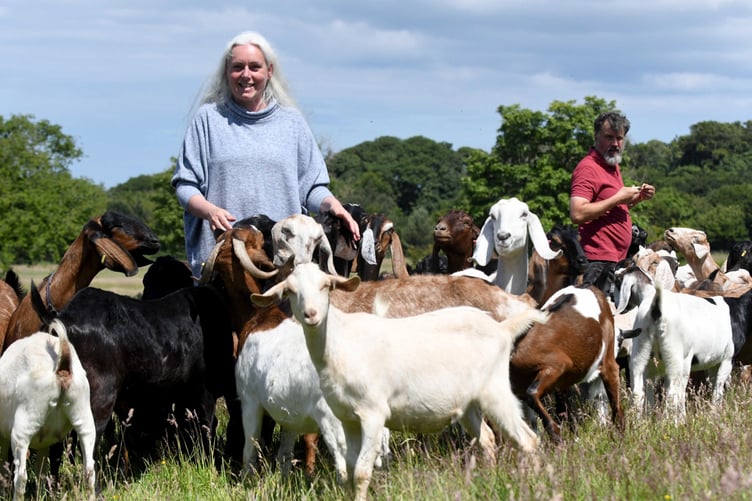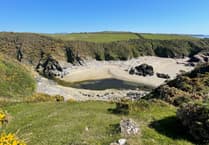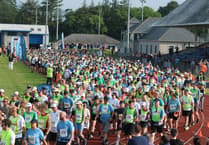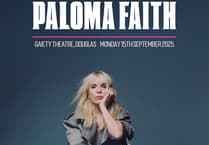Much as she dislikes the phrase ‘we’ve been on a journey’, Clare Lewis has to admit that it does describe rather well the way Isle of Man Goat Farm in Kirk Michael has evolved.
She and her partner and fiancé, Mike Walker, started out as meat producers running more than 200 Boer or Boer cross goats, along with nearly 80 Angora goats being reared for their wool. Their Manx mohair socks still have an enthusiastic fan following but now only a few Angora goats remain and this year’s clip will be the last to produce socks.
Clare says: ‘As we got to know goats as a species it’s been a natural progression to go into the dairy: it’s certainly what the local market wanted.’
As Clare established the dairy, her repertoire increased from producing not just milk, but also yogurt, kefir and a range of cheeses which have been a huge hit at her farm shop and at Isle of Man Farmers’ Markets. But, as their dairy herd – and their workload – has grown, Mike and Clare have decided to rationalise their production, concentrating on what adds most value, and this has allowed them to reduce their herd numbers.
She recently put a notice on Facebook offering some of her goats for sale and has had a good response with some sold already.
Clare explains: ‘Dairy is a lovely thing to do when you’re doing the whole thing but we’re not at the right age to go bigger and bigger. If we were 30 years younger we would put up another barn, we’d put in an automated parlour, and we would increase and increase and increase.
‘The herd reduction reflects two things: we now know that we don’t need hundreds of litres [of milk] a week to make the cheeses, and we also know the products that sell the best and that we enjoy making.
‘Mike and I want to concentrate on what we enjoy, what adds the most value, and what our core customers rely on.
‘You don’t need to milk a lot of goats to actually turn a profit and then you can be high welfare so it’s win-win all the way through. And obviously our feed bills are less now that we have less than 100 goats.’
She and Mike have also made a big change in their milking routine.
‘This spring, before we kidded, we made the decision not to wean the kids off their mums fully and it’s been life changing,’ says Clare.
Previously they went down the conventional route of weaning the kids at three to four weeks old and bottle feeding them on formula milk so that all their mothers’ milk went to the dairy.
Clare says: ‘If you take a kid off its mum to bottle raise it you will be giving it a bottle for a good six months.
‘I would actually spend a good four hours a day bottle feeding, for months. And there’s no success feeding goat kids off a bucket system: they need to have the human contact and if you wean them off their mums you’ve got to give them that.
‘We also had to milk twice a day, every day, you just can’t miss it.
‘But this spring we didn’t milk any of the mums until the kids were about a month to six weeks old - the single kids about a month and the twins a bit longer.
‘Last thing in the evening Mike will go out to the barn and he’ll decide which ones he wants to milk for the dairy in the morning. He’ll take those mums out of the group to go with the rest of the herd and first thing in the morning he does the milking, then the mums have their kids back for the rest of the day.’
This new routine has meant benefits not only for the goats but also for Mike and Clare themselves, as she explains:
‘It’s meant that the kids are very healthy because, although we used a very high quality milk powder, it’s never going to replicate what a mum will give.
‘We’ve always tried to be high welfare for ourselves and for our customers - that’s been the backbone of our business.
‘But this has taken it to a new level and the difference for Mike and I is absolutely amazing. We’ve both got more hours in the day because we’re not bottle feeding, we’ve got less health problems in the kids, the mums are happy, and we’ve got our evenings back – we can actually have a proper meal, we can see friends we can go for a walk together.’
The new regime always saw them learning just how smart a goat mum can be. Clare says: ‘Now we know that the mums are a little bit canny so they don’t give you all the milk in the morning they will hold a bit back for the kids and they are quite capable of doing that.’
As she has also learned more and more about cheesemaking, Clare has also come to love the dairy work.
She says: ‘I really enjoy it. Mike will say: “Oh you’ve got 90 litres to process and I can make a cup of tea and make a list of what I want to make and it’s just lovely.
‘In the dairy there’s always something in the pipeline, something that needs looking after and it’s lovely because we’ve now got a range of about 10 different cheeses plus the yogurts so it’s really nice because life’s not repetitive.’
Clare would also love to see more local cheese being made on the island and more customers having the chance to purchase it.
She says: ‘It doesn‘t really make sense to Mike and I that we’re the only farm making cheese. There is such a following for local, there’s such a following for artisan, and it’s really quite a humbling experience, a real blessing, to get to know your customers and to have this relationship.
‘I do think there’s scope for more than one farm doing this in the Isle of Man, especially the liquid milk, and Mike and I would be more than happy to help someone start off. The island is crying out for more local cheese.’

.jpeg?width=209&height=140&crop=209:145,smart&quality=75)



Comments
This article has no comments yet. Be the first to leave a comment.